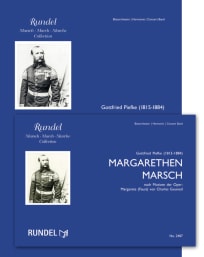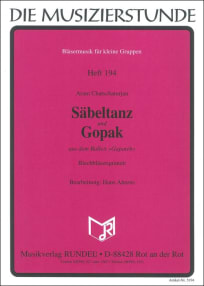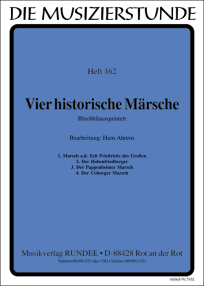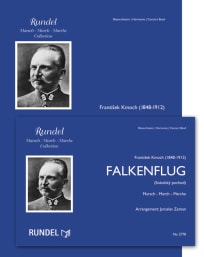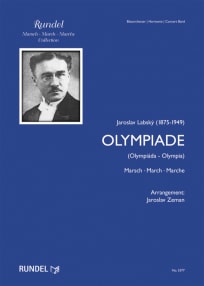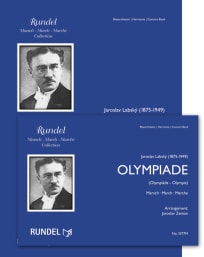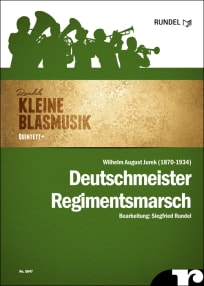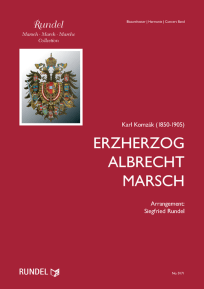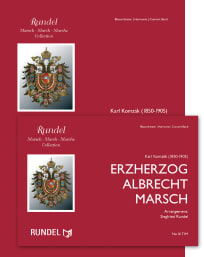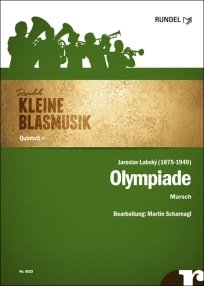Banda (Orchestra di fiati)
Preußens Gloria
Prussia's Glory
Marsch - March - Marche

Banda (Orchestra di fiati)
Preußens Gloria
Prussia's Glory
Marsch - March - Marche
Compositore
Arrangiatore
Genere
Evento
Durata
00:01:45
Difficoltà
Oberstufe
Editore
Rundel
Formato
Formato Librettabile
Info
Partitura completa + Condensata + Parti
Numero d'edizione
MVSR1687
Data di pubblicazione
2018 / 1992
Leggi
Lista dei Desideri
Stampa
Consiglia
Info
It goes without saying that the victorious Franco-German War of 1870/71 and - associated therewith - the foundation of the German Empire together with the proclamation of the German emperor in the castle of Versailles on Jan. 18, 1871, exercised a tremendous influence on German march literature. Prussia's Glory by Gottfried Piefke is an evident title for this phase euphoric and patriotic exuberance in times of military victories and national unification. It is probably the most performed march in the German Federal Armed Forces today as there hardly is any festive or solemn occasion that can get along without it. Thus Prussia's Glory has become the symbol for Prussian band music per se.
Gottfried Piefke composed the piece for his 8th Life Grenadiers in 1871. Striking up this march, the band returned to its home garrison in Frankfurt on the Oder in 1871. Now, however, something extremely unexpected did occur: it only survived the following 38 years in kind of a niche existence in the Brandenburg province. I was neither known in the army nor was it familiar among the public. This situation did not change before 1909 when Lieutenant General Elstermann v. Elster who had served as company commander in the 8th Life Grenadiers from 1894 to 1899 acquired a liking for this march and had the parts sent to him from Frankfurt on the Oder when he became regimental commander of the 3rd Foot Guards in Berlin. The regimental band under the baton of Senior Bandmaster Hugo Goerisch rehearsed the march, and finally one day in spring 1909 the castle guard provided by the 3rd Foot Guards marched into the City Palace to the music of Prussia's Glory. The emperor would usually step onto the balcony of the City Palace, when the approaching guard became clearly visible. He liked the march at once, as he had sent for Senior Bandmaster Goerisch after the guard mount since he wanted to learn more about that piece. This occurrence spread like wildfire throughout the Berlin garrison, so that each one of the Berlin guards regiments marched into the City Palace to the music of Prussia's Glory during the following weeks. Thus it became generally known, and was included into the collection of army marches in 1912. Since that time it has become and indispensable asset of German military music.
Gottfried Piefke composed the piece for his 8th Life Grenadiers in 1871. Striking up this march, the band returned to its home garrison in Frankfurt on the Oder in 1871. Now, however, something extremely unexpected did occur: it only survived the following 38 years in kind of a niche existence in the Brandenburg province. I was neither known in the army nor was it familiar among the public. This situation did not change before 1909 when Lieutenant General Elstermann v. Elster who had served as company commander in the 8th Life Grenadiers from 1894 to 1899 acquired a liking for this march and had the parts sent to him from Frankfurt on the Oder when he became regimental commander of the 3rd Foot Guards in Berlin. The regimental band under the baton of Senior Bandmaster Hugo Goerisch rehearsed the march, and finally one day in spring 1909 the castle guard provided by the 3rd Foot Guards marched into the City Palace to the music of Prussia's Glory. The emperor would usually step onto the balcony of the City Palace, when the approaching guard became clearly visible. He liked the march at once, as he had sent for Senior Bandmaster Goerisch after the guard mount since he wanted to learn more about that piece. This occurrence spread like wildfire throughout the Berlin garrison, so that each one of the Berlin guards regiments marched into the City Palace to the music of Prussia's Glory during the following weeks. Thus it became generally known, and was included into the collection of army marches in 1912. Since that time it has become and indispensable asset of German military music.

